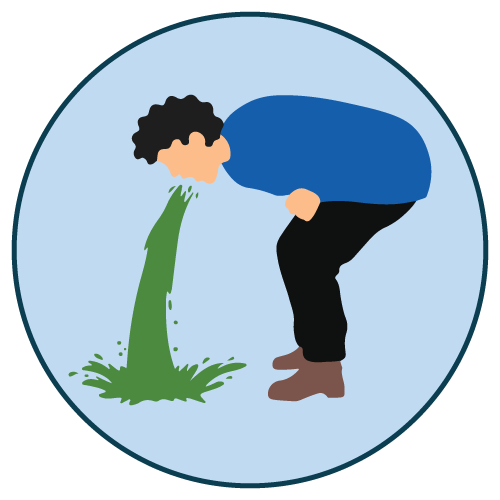| Name | Vomiting |

Vomiting
When vomiting, everything is forced out of the stomach and from the upper part of the digestive tract by mouth. It is not a disease but a symptom of the disease, but sometimes excessive vomiting is considered a disease.
Vomiting is a physical reflex that protects the body from harmful substances or substances. Most people experience nausea or vomiting at some point.
What are the symptoms associated with vomiting?
Excessive contraction of abdominal muscles may occur during vomiting. There may also be vomiting in addition to contractions of the abdominal muscles. A person usually feels nauseous before nausea. Nausea is an uncomfortable feeling and realizing that you are going to vomit. Once vomited, your nausea may subside or go away.
Other symptoms that you may experience along with vomiting are:
- Mouthwatering - If you continue to vomit, your mouth will often start to water.
- Abdominal pain - Pain in any part of your ribs and lower part of the pelvis and abdominal pain can occur along with vomiting.
- Diarrhea - a common combination of symptoms of diarrhea and vomiting gastroenteritis.
- Dizziness - Mild headache, feeling of restlessness or fainting.
- Vertigo - Feeling dizzy or moving, although in reality the head is not moving, or the body is not moving.
What causes vomiting?
Vomiting can be of two types. Such as acute vomiting which suddenly becomes acute and usually lasts up to 2 days. The other is chronic vomiting which is recurrent for a long time.
Causes of severe vomiting
- Gastroenteritis - a gastrointestinal infection - is one of the most common causes of nausea and vomiting.
- Food poisoning - Some bacteria can secrete toxins in foods that are not stored properly. This can lead to food poisoning.
- Poisoning - This can cause nausea and vomiting, drowsiness, and convulsions.
- Getting on the bus, train, or plane - it is more common in children than in adults but can also cause nausea in adults.
- Alcohol - Excessive alcohol consumption leads to frequent nausea and vomiting.
- At least one-third of the adults experience nausea and vomiting after surgery, known as postoperative nausea and vomiting.
- Appendicitis - Nausea and vomiting can be caused by appendicitis.
- Pancreatitis - Inflammation of the pancreas usually causes abdominal pain, vomiting and fever.
- Excessive intracranial pressure - Increased pressure on the scalp can cause nausea and vomiting which is an emergency medical condition.
- Meningitis - sudden nausea, fever, stiff neck, pain when looking at bright light (photophobia) and sometimes red or purple rash that does not go away when pressed.
- COVID-19 - Nausea, diarrhea and vomiting can all be symptoms of COVID-19.
- Diabetic ketoacidosis - Vomiting can be a symptom of diabetic ketoacidosis, where the body does not have enough insulin to break down sugar.
Causes of chronic vomiting
- Medications - Some medications can cause vomiting due to side effects, such as chemotherapy drugs used to treat cancer.
- Radiation therapy - Vomiting can occur as a side effect of radiation treatment.
- Vitamins - High doses of vitamins can cause vomiting.
- Pregnancy - Morning sickness and nausea are common symptoms in early pregnancy. This can also cause nausea and vomiting at any time of the day.
- Migraine - nausea and vomiting are common symptoms of migraine headaches.
- Food allergies
- Vomiting may be due to a disorder of the upper digestive tract or gastrointestinal obstruction.
- Gastroparesis - This delays emptying the stomach due to nerve damage that can lead to nausea and vomiting after meals.
- Kidney Stones - Kidney stones cause nausea and vomiting along with back pain.
- Effective nausea and vomiting - this is the name for chronic nausea and vomiting for which there is no clear treatment.
When should I see a doctor?
If vomiting is caused by gastroenteritis, it often gets better quickly without consulting a doctor or taking medication. However, you should go to the emergency department of the hospital or talk to a doctor if you have vomiting:
- Vomiting with blood or vomiting is like coffee color.
- Vomiting with Bile which is green in color.
- Vomiting contains stool.
- Severe or persistent abdominal pain.
- Photophobia (pain when looking at bright light).
- Severe headache.
- Bleeding from the rectum or bloody diarrhea.
- Chest pain.
- Fever with high temperature.
- There are symptoms of dehydration.


 Bangla
Bangla English
English